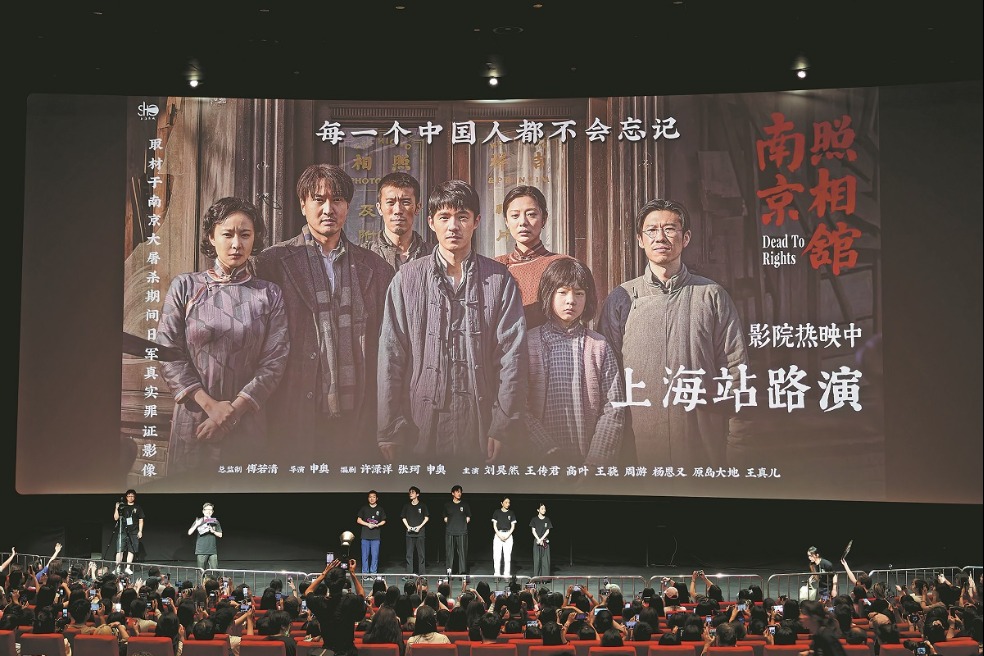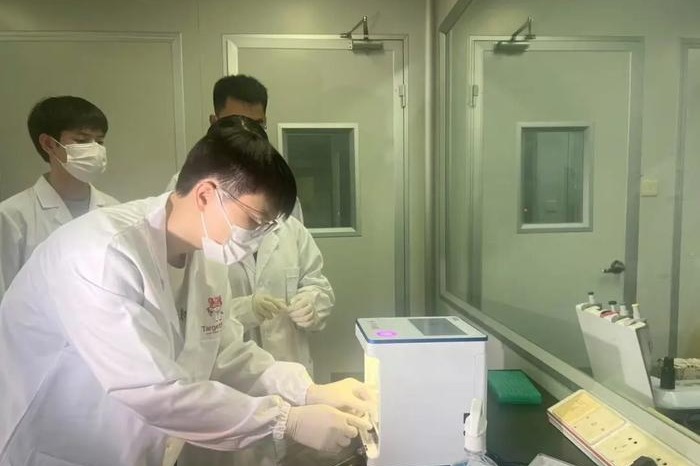Experiencing films beyond the screen
A charity program is producing barrier-free versions of movies for people with vision loss, Wang Qian reports.

When a looming collision with Jupiter threatens Earth as humans steer our planet like a rocket ship to search for a new star amid stellar effects and jaw-dropping sci-fi scenes in the blockbuster, The Wandering Earth, Ma Deli leaned forward and clutched the arms of her chair as the thrilling plot took grip of her.
"It felt like I was in the movie," says the 50-something, who totally lost her sight about a decade ago.
She was listening to the barrier-free film in a theater in Xichang, Sichuan province, in which vivid voice-overs narrated descriptions of scenes that enthralled Ma, who enjoyed her first such flick in September 2019. Since then, she and other people with vision loss have been able to attend screenings providing descriptions of the plots between dialogues on the fourth Sunday morning of every month across Sichuan.
The service is provided by the Ever Shining Cinema charity program, launched by the Communication University of China, Beijing Gehua CATV Network Co and Oriental Jiaying Media Co.
Over the past six years, nearly 600 films have been given such added audio descriptions and made available in 2,244 special education schools nationwide. More than 800 teachers and students have volunteered to produce these barrier-free versions.
"It is the seventh year of the project, through which we hope to bring (more experiences) to more people with vision loss, while raising public awareness of this group," says Fu Haizheng, vice-dean of the Research Institute on Information and Communication Accessibility affiliated with the Communication University of China in Beijing and an initiator of the program.
Fu recalls that the idea came about during a group discussion on how to improve life for people with vision loss. A teacher asked — although walkways are equipped with amenities to assist people with vision loss — what about their access to cultural products?
China had nearly 28.6 million people with vision loss by the end of last year, according to data from the National Bureau of Statistics. At least 8 million are completely sightless, according to the China Association of Persons with Visual Disabilities.
Fu and his colleagues decided to use their expertise in film to "pave the way to let people with vision loss enjoy the benefits of culture".
The opening line of each barrier-free film version they've produced says: "Welcome to Ever Shining Cinema, which conveys color through sound and depicts art through listening."
The first issue they must overcome is film availability. Beijing Gehua CATV Network and Oriental Jiaying Media provided five movies to start the program.
A discussion was held in a meeting room in the Television School of the Communication University of China on how to make films accessible to people with vision loss. Some teachers suggested narrations of each roughly two-hour film reinterpreting them into half-hour stories through audio recording and editing. But this approach was abandoned because they wanted to provide a fully immersive film experience to people with vision loss.
"Ever Shining Cinema's barrier-free movies include play-by-play narrations of what's happening on-screen in between dialogues and sound effects. These narrations describe the scenes and the meanings and emotions behind them," Fu says.
The processes of scriptwriting and revising, and audio recording, editing and mixing require tens of thousands of clicks on pause buttons to get familiar with every detail from shot to shot, he says. It takes about a month to finish a film.
In April 2019, the project participated in the Beijing International Film Festival as a permanent section. Although China's movie industry has experienced rapid growth over the past decade and had 86,310 screens by the end of last year, according to the China Film Administration, enjoying films at cinemas is not a common treat for people with vision loss.
The festival featured the barrier-free version of Hello Mr Billionaire, a comedy loosely based on the 1985 Richard Pryor film, Brewster's Millions.
It was the first film that Li Yiying had provided a barrier-free version. She says she still has a vivid memory of how every detail, from wording to conveying emotion, was edited and revised.
She spent more than a week writing the narrative script, and another two weeks proofreading and perfecting it.
"I got an experienced tutor, who guided me through the work on the text. The most common question he raised was, 'Can a blind person understand this?'" Li says, adding that the question is the most basic — yet often also the most challenging — requirement for a barrier-free film.
She was, for instance, stumped by how to describe a scene in which the protagonist takes a bundle of money out from a safe to support the speech of a hypocritical writer.
"At first, I suggested describing the stack of bills to be 'as high as a forearm is long', but my colleague rejected that, saying it's not a commonly used term," Li recalls.
"In the end, we estimated the amount was about 200,000 yuan ($28,000), so we used that number."
There were many such discussions on selecting the proper wording for the scripts, she says.
After the script was done, they needed to record, edit and mix the audio. If there were any problems, they had to start from scratch — "five times", she recalls, clearly.
"The script contains 28,700 characters, and numerous pauses and stops. It's my dream to make films accessible to people with vision loss," Li says.
Ever Shining Cinema has also brought barrier-free versions of films for people with vision loss to the Hainan Island International Film Festival, the China Changchun Film Festival and the Silk Road International Film Festival.
Since 2018, Fu and his team set a goal to make 104 films accessible to visually impaired audiences every year, so they could enjoy the equivalent of two movies a week.
Usually, it takes a month for a production team of eight to 10 people to finish a barrier-free version of a movie, according to Fu.
During the COVID-19 pandemic, the Ever Shining Cinema team explored online channels to make films accessible to people with vision loss. In 2021, the project launched an app that brings the charm of movies to home screens, and the team also produced the first barrier-free version of a TV series, The Legendary Tavern, that year.
"From movies to TV series, from silver to small screens, the barrier-free version of The Legendary Tavern marked a step further in the development of Ever Shining Cinema," Fu says.
In 2021, 1921, a film celebrating the 100th anniversary of the founding of the Communist Party of China, opened with simultaneous regular and barrier-free screenings by Ever Shining Cinema in Beijing.
"We'll continue to try new ways and paths to enable access to information to all, improve our professional production standards and explore precise promotion models to contribute to building an inclusive culture and environment," Fu says.
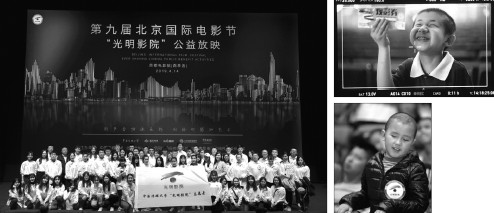
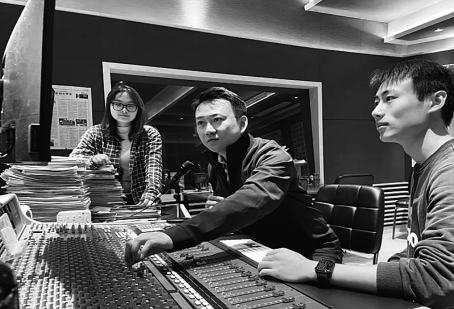
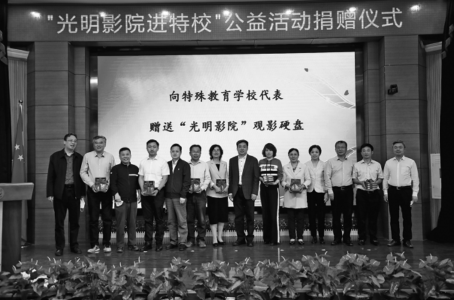
Today's Top News
- Japan must face up to its wartime past
- Vision turns county into green model
- China rolls out new visa type for young science talent
- Cambodia, Thailand urged to engage in dialogue, rebuild trust
- China stays at forefront of global digital growth
- Beautiful China vision has sown the seeds for the blossoming of an ecological civilization: China Daily editorial


















